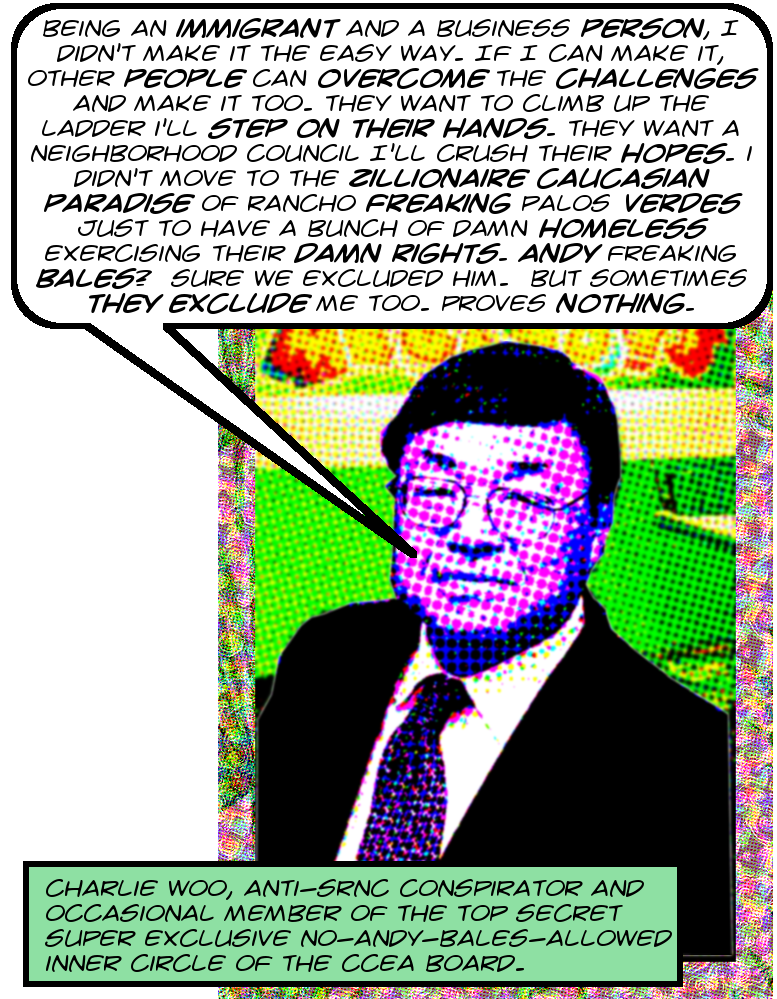 Background: You can read my previous stories on the Skid Row Neighborhood Council formation effort and also see Jason McGahan’s article in the Weekly and Gale Holland’s article in the Times for more mainstream perspectives.
Background: You can read my previous stories on the Skid Row Neighborhood Council formation effort and also see Jason McGahan’s article in the Weekly and Gale Holland’s article in the Times for more mainstream perspectives.
Recently I reported that nine out of the twelve members of the Board of Directors of the Central City East Association egregiously violated the Brown Act during their weeks-long participation in the anti-Skid-Row-Neighborhood-Council conspiracy centered around the shadowy anonymous Delaware-incorporated entity United Downtown Los Angeles LLC. Well, I’ve been continuing to investigate this matter, not only with respect to the involvement of CCEA executive directrix and Skid Row voodoo queen Estela Lopez and the CCEA board of directors, but from many other angles as well.
As part of the investigation I’ve been seeking via the California Public Records Act various emails between CCEA’s board and staff. I’ve actually been asking for these for almost a year now. Estela Lopez has been consistently obstructionist, mostly claiming that all such emails are exempt due to the famously abused, mostly made up, so-called deliberative process exemption to the CPRA.1
This position is indefensible, of course, and there have been some demand letters exchanged between my lawyer and some attorneyesque dude known as Don Steier, who seems to be very buddy buddy with the CCEA conspiracy. The CCEA remains mostly uncooperative, although they did cough up about 50 pages of emails they’d formerly claimed were exempt.2 An even superficial perusal of the evidence will show conclusively that their original claim that this stuff was exempt is nonsense of the first water, and the material they released is mostly chaff.3
However, there is still some interesting information to be gleaned from this release. In particular, the fact that Estela Lopez was involved in extensive secret email discussions with 9 out of 12 CCEA directors, excluding Andy Bales, Richard Gardner, and Sylvia Kavoukjian, was in fact not an anomaly. It seems that she habitually sends emails to everyone but those three.4 I have no idea at this point why those three directors are excluded on a regular basis. Perhaps someone more up on Downtown politics will be able to figure it out. Anyway, turn the page for some examples, some discussion, and some mockery of Don Steier, the CCEA’s lawyerlike co-conspirator.5
So for the sake of reference, here are the members of the CCEA board’s top secret inner circle:
- Matt Klein mklein@hbkinv.com
- Mark Shinbane MarkS@ore-cal.com
- Larry Rauch lrauch@lacold.com
- Howard Klein Howard.Klein@oceanbeauty.com
- Ernie Doizaki edoizaki@kansasmarine.com
- Drew Bauer DrewBauer@youngsholdings.com
- Don Steier donsteier@gslawla.com
- Dilip Bhavnani dilip@sunscopeusa.com
- Bob Smiland bsmiland@inner-cityarts.org

- January 6, 2017 — Estela Lopez writes to the select top secret inner circle about some development nonsense reported in Bloomberg.
- January 17, 2017 — Estela Lopez writes to the whole board including Bales, Gardner, and Kavoukjian about an article in
Carol Schatz’s diarythe Downtown News about how freaking non-crime-ridden Downtown Los Angeles is. - February 12, 2017 — Estela Lopez writes to the top secret subgroup of the Board about some Little Tokyo development nonsense.
- April 4, 2017 — Estela Lopez writes to the whole board including Bales, Gardner, and Kavoukjian about some meeting with some cops.
- April 22, 2017 — Estela Lopez writes to the secret sub-board about a bunch of arrests in Skid Row.
- April 29, 2017 — Estela Lopez writes to the cabal about how darn colorful Downtown Los Angeles has become.
- May 10, 2017 — Estela Lopez writes to the secret sharers about pit bulls and whatnot.
So it looks like Estela Lopez and 9 out of 12 board members routinely exclude these other three from their discussions. Without the rest of the emails, it would seem to be impossible to discern why this is. It made some sense with respect to the conspiracy against the Skid Row Neighborhood Council. After all, not everyone wants to conspire against such things, and it’s probably better to leave them off your mailing list if they’re not inclined to join the conspiracy.

And don’t think I forgot the mockery! Just take a look at this juicy little number, an email from Estela Lopez to the boys on May 26, 2017 about a homicide in Skid Row. But what’s different about this particular item is that, for whatever reason, it came to me embedded in a screenshot of Don Steier’s email inbox.

And finally, there’s the bare, shocking, fact that he evidently uses Yahoo! Mail to run an actual business. And not just any business, but a law office, which carries along with it some actual enforceable professional standards to do with confidentiality and agency. Does anyone in 2017 not know how freaking hackable Yahoo! is?! How is it remotely professional not to pay for actual secure email hosting? Enquiring minds want to know and maybe, just maybe, we’ll find out! If we do, I promise you, you’ll be the second to know.
Image of Charlie Woo is ©2017 MichaelKohlhaas.Org and is a transformative modificlacktion of this little item, which is more than likely a public record anyway. Some of the words in his bubble there are from this article here. Others I just made up myself. But just because they’re made up don’t mean they’re not truth.
- This so-called exemption is explained in great detail by the Reporters’ Committee for Freedom of the Press as part of their excellent and painstakingly detailed guide to CPRA:
The deliberative process privilege is designed to protect essentially three policy objectives: “First, it protects creative debate and candid consideration of alternatives within an agency, and, thereby, improves the quality of agency policy decisions. Second, it protects the public from the confusion that would result from premature exposure to discussions occurring before the policies affecting it had actually been settled upon. And third, it protects the integrity of the decision-making process itself by confirming that ‘officials should be judged by what they decided, not for matters they considered before making up their minds.'”
As are some of the criteria for applying it, as determined by various courts (all citations to cases are omitted, but can be found in the original source):
The key question in every case is “whether the disclosure of materials would expose an agency’s decision making process in such a way as to discourage candid discussion within the agency and thereby undermine the agency’s ability to perform its functions.” To qualify for the privilege the document sought must be both predecisional and deliberative. “To establish that a document is predecisional, an agency must identify an agency decision of policy to which the document contributed [citations omitted], or at least must show ‘that the document is in fact part of some deliberative process’ [citations omitted].” To show that a document is deliberative, a document generally must consist of opinions or recommendations.
- I will publish these all soon. They still need some processing and I’m overwhelmed with material right now. Drop me an email at mike@michaelkohlhaas.org if you need them sooner.
- Note, though, the complete absence of the United DTLA material from this release. Since every last one of those emails was in the possession of nine board members and Estela Lopez, the chance that an honest search for responsive material would have missed it is essentially zero. The CCEA may yet live to regret making the choice to withhold all this clearly non-deliberative material.
- It seems as likely that there are replies from this select group of Board members, but she hasn’t seen fit to hand over any of those….yet.
- Who is celebrating 43 years with no public record of discipline. You go, Don!
- Except I do know one thing to think, which is that all of this proves multiple serial ongoing egregious violations of the Brown Act, compliance with which has never ever ever never been a strong suit of the CCEA. I daresay they’re going to live to regret this as well.
